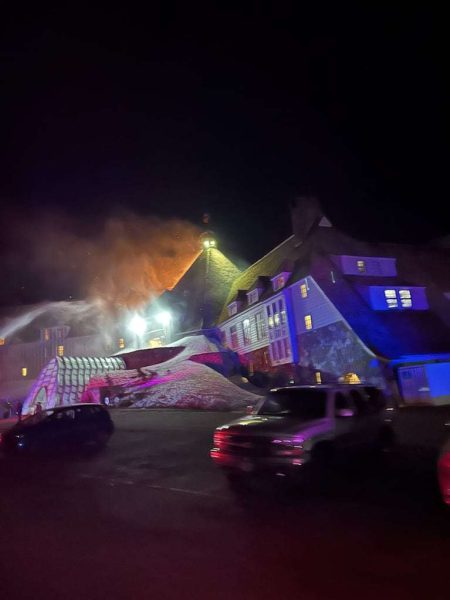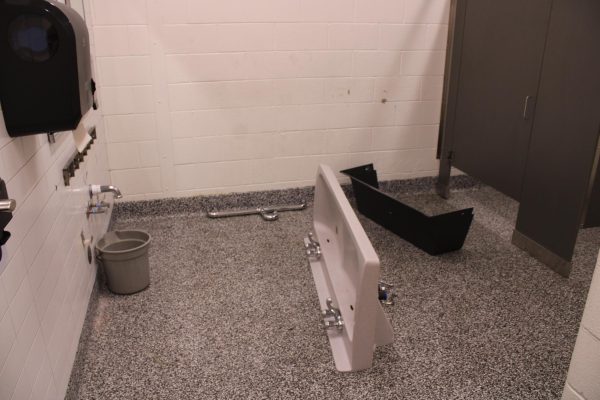Situation in East Palestine is Off the Rails!

A toxic cloud looms over East Palestine, Ohio
April 18, 2023
On February 3rd, around 9:00 in the evening, a freight train carrying hazardous materials derailed near East Palestine, Ohio. The derailment caused a release of toxic materials into the surrounding environment, polluting the nearby water, soil, and air.
The local communities were evacuated and a controlled burn of some of the hazardous substances was carried out. Following the crash, multiple lawsuits, including one from the US Department of Justice, were filed against the company that owned the train – Norfolk Southern.
While the cause of the derailment remained unknown for multiple weeks, it was later determined to have been caused by a faulty wheel bearing which had overheated and eventually caught fire. The burning wheel bearing was only discovered after the train passed an HBD or hot bearing detector, which reported that the bearing in question had skyrocketed to 253 degrees over ambient temperature.
By the time the train was finally stopped, 38 of its 149 cars had been ripped off the tracks and left in a burning heap just outside the small Ohio town. According to Jennifer Homenday of the National Transportation Safety Board, the crash was “100% preventable.”
Of the 38 cars that derailed, 11 contained toxic materials, and 5 contained a chemical called vinyl chloride. Vinyl chloride is a colorless, odorless gas used in the production of PVC piping and a wide variety of other plastic products, as well as being a byproduct in cigarette smoke. Vinyl chloride is a known carcinogen, and in acute concentrations, can cause headaches and disorientation.
Shortly after the crash, residents of East Palestine soon reported unusual symptoms including headaches, nausea, a burning sensation on the skin, and sore throats.
The Environmental Protection Agency confirmed that pollutants, including vinyl chloride, were detected in local streams and rivers. According to the Ohio Department of Natural Resources, nearly 45,000 marine animals were killed as a result of the chemical spill.
On February 5th, officials ordered an immediate evacuation of the area within a mile of the crash site amid concerns of a possible explosion. The next day authorities expanded the evacuation area by an additional mile.
Shortly after the evacuation order was expanded on February 6th, emergency crews began releasing and subsequently burning the vinyl chloride. The operation, which was performed to prevent an explosion, produced a massive toxic cloud of smoke which loomed over East Palestine.
On February 8th, following tests showing that pollutants were within acceptable limits, the evacuation order was lifted and East Palestine residents were allowed to return to their homes.
For many, the blame for this catastrophe lies with Norfolk Southern, the company that owned and operated the train. Norfolk Southern is one of the largest rail companies currently operating within the United States; they own more than 19,000 miles of railroad.
Norfolk Southern has repeatedly apologized for the incident and has already spent over $20,000,000 on the cleanup. According to Norfolk Southern CEO, Alan Shaw, the company will stay in East Palestine until the cleanup is complete, however, Shaw refused to make any actual monetary commitments to the project.
Norfolk Southern, which has repeatedly pushed back against railroad safety regulations, is now being sued by many families from East Palestine who were affected by the crash, as well as by the Ohio State Department, and the US Department of Justice, who filed a lawsuit on behalf of the Environmental Protection Agency. Both the Ohio State Department and DOJ cases are seeking to hold Norfolk Southern responsible for the chemical spill and cover any damages and expenses incurred by their respective agencies.
This incident has driven many to push for more intense and comprehensive regulation and oversight for railway safety. A new bipartisan bill has been submitted in response to the East Palestine incident. Known as the “Railway Safety Act,” the bill calls for, among other things, more hot bearing detectors along railroads, increased training for new employees, and steeper fines for violations of safety regulations. The legislators hope that the bill will reduce the chances of another event like this happening again.














